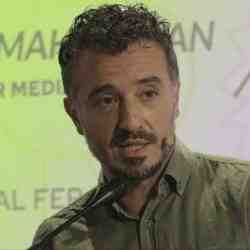Bevezetés
Greta is investing in the abilities of Mexican youth and fighting structural deficiencies to create a more inclusive and future-oriented society. Through creating an index of dynamic information, engaging relevant partners in the public and private sectors and activating this essential demographic, she is mobilizing young people to become the designers of the future.
Az új ötlet
Greta created Ollín: Youth in Motion as a ¨think and do tank¨ that designs and implements strategies within the public, private, and social sectors which allows for increased and higher quality opportunities for youth to meaningfully participate in Mexican society.
Greta's programs revolve around increasing youth civic participation, opening employment opportunities and improving conditions, strengthening hard and relevant skills acquisition, and creating real representation in positions of influence. Within the public sector, Ollín maps political party and institutional makeup to find and support youth in politics, engages youth through debates, forums, and an ambassador program. Within the social sector, Greta works with CSOs to include more youth on their advisory boards to create a real, not token, youth voice. In the private sector, Ollín offers consultation and accompaniment to analyze current practices and then create a more focused strategy of holistic inclusion.
All intervention strategies begin with an in-depth study and publication of the current state of youth participation through the creation of a biannual Youth Participation Index. From this index, Greta and her team derive specific recommendations for target groups, directing strategies in the creation of internal programs, as well as on external lobbying and negotiation strategies. Ollín follows up every initiative with monitoring and evaluation and a new assessment of the Index indicators and scope.
Through these integrated initiatives, public and private institutions are transforming into inclusive and future-focused establishments, while the youth of Ollín are changing the ways they interact within the scope of local and federal politics, in the professional arena, and above all, in the way they see themselves as individuals with agency and efficacy.
A probléma
When a country has a greater number of young working age individuals than dependents (older and younger than the productive age), the economy should flourish due to this demographic advantage, but without adequate and appropriate infrastructure and opportunities, capable young people are left disempowered and without professional, economic, or political agency. There are about 31 million youth in Mexico between the ages of 15 and 29, and there is a clear infrastructure failure to provide necessary education and employment opportunities for the youth that make up almost 30% of the population.
In Mexico, with only 37.3% of adults holding a four year high school degree, and 19.9% holding a college degree, a lack of professional advancement opportunities for young people is a pervasive issue for the entire societal and economic structure of the country. Because of systemic prioritization of specialized training, even many university educated youth end up working in the informal economy and in positions that under-represent their education and skills.
The Mexican youth unemployment rate is around 9% - over twice the total population unemployment rate. Underemployment, unemployment and the lack of personal and political efficacy causes many young people to seek work outside of Mexico, usually in the United States, or to become involved in organized crime or other black-market endeavors. Young people also gain the lowest wages in the country- which is not surprising taking amount of experience into account, however in Mexico, the statistic is concerning: 85% of youth earn the lowest wages in the country, at 6,000 pesos (US$350 a month or US$11.50 a day) or less.
Around 20% of youth neither study nor work, and are thus not counted in the youth labor force. This is officially referred to as NEET (not in education, employment or training), and is principally the result of inadequate opportunities for meaningful engagement in education, employment, and society in general. The percentage is significantly higher among young women than young men, accounted for by different levels of domestic responsibilities roles as well as a systemic lack of equal opportunities, especially for women in rural and semi-rural areas. While it is not a societal problem to have a small NEET population, for domestic and other related activities, 20% of all youth fitting within this category is a strain on the economy and public institutions.
IMJUVE (The Mexican Institute for Youth within The Secretariat of Social Development) is the entity in charge of youth affairs, but its primarily focus is on assistance programs- varying from teen pregnancy reduction to scholarships and stipends. These programs tend to be focused on treating side effects instead of root causes of youth disengagement and exclusion. IMJUVE more recently added an employment and entrepreneurship focus, though high turnover rates and budget issues within the institution have created obstacles in actually creating effective youth initiatives. A lack of understanding of the root causes of disengagement and comprehensive analyses to find strategic ways to activate important actors and make space for this demographic has created a standstill in the conversation. There has been no systematic way of measuring youth engagement or offering a framework to create data-based recommendations across the spectrum up until this point.
A stratégia
Greta’s “Think and Do Tank” designs and implements strategies that promote youth participation in the private, public, and social sectors. In order to see true systemic change, Greta and her team intervene in four main areas: investigation and monitoring; public policy creation, support, and lobbying; private and social sector interventions; and skill development, capacity building and direct engagement. Having a holistic view of youth participation, Greta is able to increase engagement at all levels and contribute to a true transformative movement that activates this segment for the benefit of all actors and institutions.
Greta's focus on data analysis and divulgation stems from her academic background and her belief in informed, data-based proposals and actions. Greta's Youth Participation Index is a biannual report that publishes information on youth engagement from political party involvement and private sector employment and conditions to education status and institutional challenges, on a federal level. With the help of the ambassador program and local government support, Ollin is beginning to conduct and present research on a state level as well, with a special focus on rural youth participation and engagement. For Greta, it is essential to both collect as well as synthesize and report data to those to whom it matters most- the youth and government institutions who took part in the studies. With a new partnership with World Vision and Reforestamos Mexico, Ollin is conducting studies in eight states and then will report the individual community results to the communities themselves. In this way, Greta has a two way, continual feedback system of communication surrounding the topics and indicators that matter most. She believes that publishing research that never makes its way back to the participants does not accomplish its full intended purpose of changing attitudes, actions, and policy.
Greta and her team use these findings and recommendations to lobby for more inclusive and effective youth policies, especially those that promote increased ties between the private sector and youth. Ollin's data-based recommendations have played a role in the creation of government strategies, as seen through the implementation of Youth Credit (IMJUVE and INADEM) and the National Strategy of Youth Employment (IMJUVE). In addition to lobbying, Ollin has created the Youth Plan for Democracy, a holistic plan to tackle youth disengagement and activate political institutions. Ollin works to sustain projects and improve youth structures and representation within national political parties, and through the addition of forums for political debate and workshops to these policy recommendations and support of young politicians, Greta is creating networks of efficacious youth, and interceding in national public policy, confronting the diverse and complex causes of youth isolation.
Within the private sector, Ollin is creating favorable conditions and employment opportunities for youth employment through IUVENIA Award for Youth-Friendly Enterprises. Ollin analyzes the current state of organizations that wish to participate and assists them in creating more attractive and inclusive opportunities for youth. This program has a business consultancy fee, and adds to the financial sustainability of Ollin. Greta plans to move towards greater financial sustainability by continuing and increasing the sale and scope of these services.
In terms of hard skill development and professional advancement, Greta equips, offers exposure, and activates Mexican youth through direct engagement programs. Through Ollin's ¨Youth Constructing¨ blog, Mexican youth's professional writing is featured, and given exposure and access to national competitions and recognition. To increase Ollin's exposure and influence in all Mexican states, Ollin has created the State Ambassadors program, in which selected youth act as Ollin ambassadors in their schools and communities to be trained in research methods, assist with data collection, and become mavens by promoting increased youth participation in their daily lives.
Greta knows that to be effective, it is essential to work collaboratively. Ollin currently works with Berlin's Youth Policy Lab on an international level in research collaboration, as well as the University of the West Indies, which seek to replicate Ollin's strategies and research instruments in the Caribbean. In every step, whether it is planning, implementation, monitoring, or scaling up, Ollin collaborates with other institutions to increase the reach and quality of the initiative. Reforestamos México, World Vision, Kellogg Foundation, Espolea, Juventud que Deja Huella, and IDEA Foundation are Ollin's closest partners.
One way in which Greta measures the organizational success is through coverage of their work in public policy and private sector interventions. They measure report downloads, which currently is around 9,000, and research citations annually. This year, Ollin has the organizational goal of seeing five national publications, three specialized magazine articles, six academic citations, one citation in legal documents, and at least three media interviews. In this upcoming year, 10,000 additional jobs for youth with adequate working conditions are estimated to be attributed to Greta's IUVENIA program. Regarding influence in policy, the main social impact can be best seen through more inclusive policies within city and state governments, and local as well as federal politicians putting youth participation on the agenda.
During the first two years of Ollin, Greta supported much of the organization and the salaries of her employees through side projects and private consulting in addition to her full time commitment to Ollin. Fortunately, she has been able to procure and diversify funds that allow for sustainable growth, including the additional income of private sector services. In 2015, 10% of Ollin's income came from offering services, and 90% of the US$65,500 budget came from grants and donations. Seeking to have organizational congruency, Greta hires only young employees, providing opportunities for intrapreneurship, growth, and hard skill acquisition. In total, there are six paid employees and seven volunteers, with plans to grow as Ollin continues to strengthen its financial sustainability and solidifies national and international partnerships. Through increased strategic partnerships, broader ambassador and youth researchers programs, and stronger financial sustainability, Ollin will widen and deepen its impact, transforming the current institutions and activating Mexico's youth.
A személy
Greta has always had a fascination with global trends, especially these trends that helped her understand Mexico's place in the broader context. She found herself gravitating towards the Model UN program offered at her school, and eventually went on to compete in international competitions where she was exposed to new ideas and perspectives. She studied International Relations during her undergraduate degree in Mexico, and went on the get a Masters in International Dispute Settlement from in Geneva, Switzerland.
In between her two degrees, Greta worked in Reforestamos Mexico, a nonprofit with a vision of environmental regeneration through community engagement. Here she learned to organize and mobilize, and years later, it was Reforestamos that offered her the opportunity to head the youth chapter and move it out of the organization, as it fell outside of its scope. This first experience of witnessing strategic, holistic youth empowerment mixed with social and environmental responsibility propelled her to eventually, after gaining more experience in the public sector, move the program outside of Reforestamos and strategically transform the program into what it is today. Within this opportunity, Greta saw how activating a group of people can really change systemic realities, and with this knowledge and experience, she morphed this initiative into Ollin, based on the conviction that something had to be done to change the present disconnect between youth, politics and the professional world.
In addition to her work with environmental issues, her experience in human rights was formative and gave her to tools to begin Ollin in 2011. After returning from her studies in Switzerland, Greta began working in the Mexican Secretariat of the Interior's Promotion and Defense of Human Rights Unit, gaining skills and perspectives on human rights in the Mexican context, and learning that every social problem requires strong and passionate leaders. Here she met political leaders who were passionate about protecting human rights in Mexico, and who inspired her to dig deeper into the root problems of the social problems she saw around her. She became interested in youth empowerment as she realized how everything she had invested in up until that point- environmental restoration, human rights, international conventions and relations- were all interrelated and could be combined in her work with youth. This platform that she created combines her passions into one coherent movement- a movement to transform institutions and empower youth to be agents of change- to be those who speak up and act rather than watch.

 Tile image
Tile image


